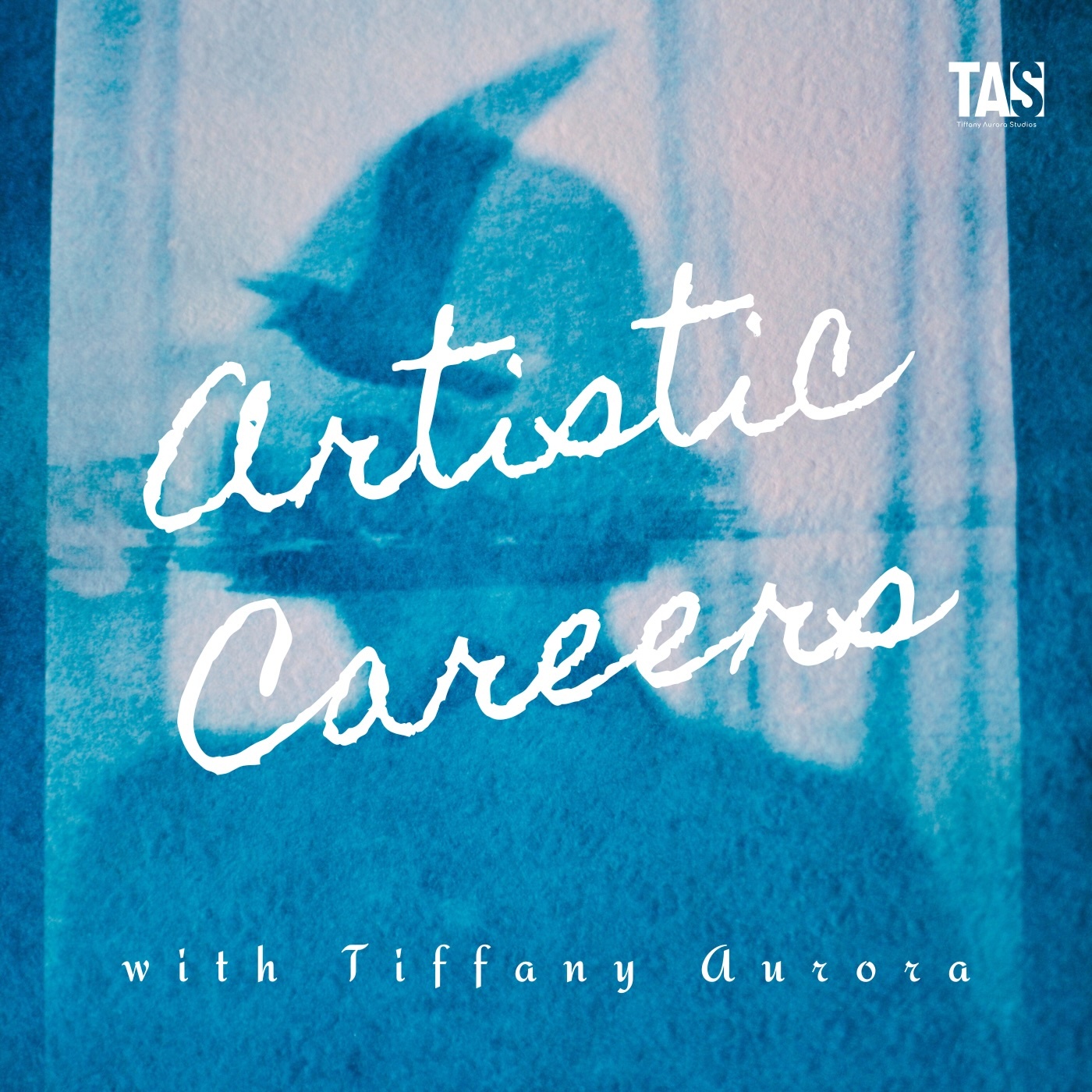
It’s notoriously difficult to pursue art as a career, but plenty of people do. Their stories might surprise you. They might also help you decide whether you will be most happy pursuing your art as a career, a side hustle, or a hobby. (Artistic Careers is a rebrand of the Entrepreneurs & Artists podcast.)
Episodes
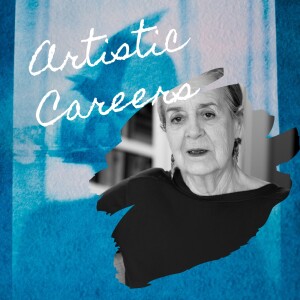
Monday Mar 24, 2025
26: Pursuing Your Dreams at Any Age with Jennifer Manocherian
Monday Mar 24, 2025
Monday Mar 24, 2025
Jennifer Manocherian is an experienced Broadway and off-Broadway producer, musical book writer, screenwriter, and film producer. Now, in her 80s, with the release of her first novel Alpha Bette, she adds "published author" to her list of credentials. On this episode, Jennifer takes us on a journey through her career, including stories from her pivot from therapy and divorce mediation into theater production, writing and producing films, and finally, putting pen to paper and writing her first novel. It’s a story that reminds us: Some dreams get better with age.
Jennifer Manocherian: https://jennifermanocherian.net/
------------------------------------
Mentioned in this episode:
------------------------------------
More conversations on film and theater careers:
- Grant Kirkhope on Building a Career as a Composer & The Drive To Keep Improving (ep. 24)
- Elana Fishbein on Improv Performance, Psychological Safety, & Becoming a Better Communicator (ep. 6)
- Rob Grabow on What Drives Us as Creatives & Tips for Noticing When You Need To Slow Down (ep. 3)
------------------------------------
This show is hosted by Tiffany Aurora: https://tiffanyaurora.com
One of the best ways to support this podcast is to recommend your favorite episode to a friend or family member. You can also support the show on Patreon.
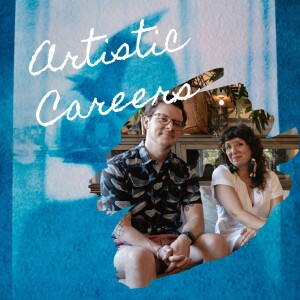
Saturday Feb 08, 2025
25: Better Together with Mike Feathers and Beth Pacione of Common Tone Music
Saturday Feb 08, 2025
Saturday Feb 08, 2025
Mike Feathers and Beth Pacione are the founders and musicians of Common Tone. Common Tone provides music enrichment programming that promotes authentic music exploration for children of all ages.
As long-time music teachers and performers in the Baltimore area, Mike and Beth know the power of music education. It's transformative. It helps children connect to each other, in a way that's different from talking. It fosters connection between kids, as well as connections between kids and their families. So Common Tone Music was born, and Mike and Beth now take their classes and performances all over greater Baltimore, creating magical spaces for kids and their families.
Common Tone Music: https://commontonemusic.com/
"Better Together" was written and performed by Mike Feathers and Beth Pacione.
------------------------------------
Mentioned in this episode:
- R House
- U.S. Surgeon General Vivek Murthy: Loneliness is like hunger, a signal we're lacking something for survival
- Jammin With You
- Charm City Books
------------------------------------
More conversations on artistic careers:
- Grant Kirkhope on Building a Career as a Composer & The Drive To Keep Improving (ep. 24)
- Annie Marhefka on Embracing Your Identity as a Writer & Publishing with a Small Press (ep. 22)
- Jessica Henkin on Live Storytelling & Being Emotionally Present (ep. 20)
------------------------------------
This show is hosted by Tiffany Aurora: https://tiffanyaurora.com
One of the best ways to support this podcast is to recommend your favorite episode to a friend or family member. You can also support the show on Patreon.
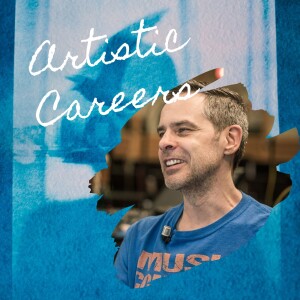
Wednesday Nov 06, 2024
24: Grant Kirkhope on Building a Career as a Composer & The Drive To Keep Improving
Wednesday Nov 06, 2024
Wednesday Nov 06, 2024
Grant Kirkhope is an Ivor Novello and World Soundtrack Award winning Scottish composer who has created the soundtrack for video games that have sold in excess of 40 million copies. He's worked on titles such as "GoldenEye," "Banjo-Kazooie," "Viva Piñata," "Donkey Kong," "Kingdoms of Amalur: Reckoning," "Civilization: Beyond Earth," "Mario + Rabies Kingdom Battle," and many more. He also recently scored the feature film, "The King's Daughter," starring Pierce Brosnan and William Hurt, which won The People's Vote at The World Soundtrack Awards 2022.
------------------------------------
Mentioned in this episode:
- Little Angels
- Mario + Rabbids Sparks of Hope
- Mario + Rabbits Sparks of Hope, "For the Galaxy" by Grant Kirkhope
- Babyface Ray, "Count Money" (feat BossMan Dlow)
- DK Rap
------------------------------------
More conversations on artistic careers:
- Andrew Ausseon on "Spellbinders" and What Video Games Teach Us About Storytelling (ep. 12)
- Haze Kim on Street Dance, Feeling Powerful On Stage, and Friends Who Help You Grow and Feel Safe (ep. 11)
- Mike Drucker on Stand-Up Comedy, Sharing First Drafts, and Embracing Kindness in Comedy (ep. 10)
------------------------------------
This show is hosted by Tiffany Aurora: https://tiffanyaurora.com
One of the best ways to support this podcast is to recommend your favorite episode to a friend or family member. You can also support the show on Patreon.
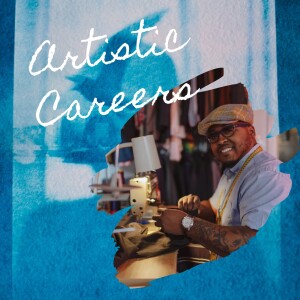
Wednesday Oct 30, 2024
Wednesday Oct 30, 2024
Aaron Jones is an entrepreneur and the owner of Bushelers of Baltimore. In this episode, we talk about how Aaron fell in love with designing and altering clothes, the tension between being an artist and growing a business, how entrepreneurship will test you and force you to grow, and what it looks like to use your business to create a safe space for your customers.
------------------------------------
Mentioned in this episode:
- 2024 BGE Energizing Small Business Grant, in partnership with Hello Alice and the Global Entrepreneurship Network (GEN)
- Treason Toting Co
- André 3000
- André 3000 interview with Rick Rubin
- Savannah College of Art & Design (SCAD)
------------------------------------
More conversations on entrepreneurship:
- Cadie Bridges-Palmer & Stephanie Fabian on Launching a Yoga Studio during the COVID-19 Pandemic and Moving from Surviving to Focusing on Growth (Episode 18)
- Mikael Dia on Building a SaaS Startup, Finding the Right Customers, and Focusing on Your Zone of Genius (Episode 16)
- Michael Amato on Preserving a Memory through a Planted Aquarium & Shifting Habits and Services So Your Business Can Grow (Episode 13)
------------------------------------
This show is hosted by Tiffany Aurora: https://tiffanyaurora.com
One of the best ways to support this podcast is to recommend your favorite episode to a friend or family member. You can also support the show on Patreon.
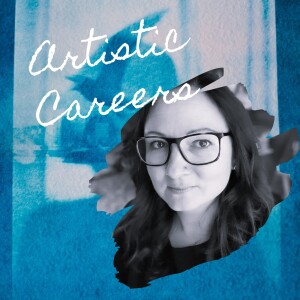
Thursday Sep 26, 2024
Thursday Sep 26, 2024
Annie Marhefka is the Executive Director of Yellow Arrow Publishing, a small, independent publisher in Baltimore. She's also a writer, primarily of non-fiction and poetry. In this episode, we talked about what it's like to work with a small press; how "telling a story that needs to be told" is one of the best ways to make your work stand out; the role of vulnerability in writing; how her own identity as a writer has shifted over the years; what it looks like to build real, genuine community with other writers who are cheering you on; and much more.
------------------------------------
Also mentioned in this episode:
- "I believe in God, and other lies we tell our mothers" by Annie Marhefka
- "You Could Make This Place Beautiful" by Maggie Smith
- Door Is A Jar Literary Magazine
------------------------------------
If you enjoyed this episode, you also might enjoy:
- Jennia D'Lima on Bringing Your Writing To Life through Emotion, Dialogue, and Voice (Episode 17)
- Emma Snyder on Owning Bookstores, Learning To Ask for Help, and the Surprising Satisfaction of the Entrepreneurial Life (Episode 8)
- A.M. Parilla on Writing Serial Web Novels and Making a Character Memorable (Episode 1)
------------------------------------
This show is hosted by Tiffany Aurora: https://tiffanyaurora.com
One of the best ways to support this podcast is to recommend your favorite episode to a friend or family member. You can also support the show on Patreon.
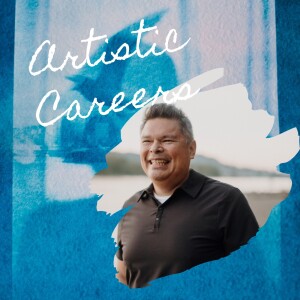
Thursday Sep 19, 2024
21: Ian Durias on Asking Powerful Questions & Working with a Coach
Thursday Sep 19, 2024
Thursday Sep 19, 2024
Ian Durias is a certified coach and a stand-up comedian. He's the founder of Copious Coaching, where he specializes in working with people who are ready to take the next steps after divorce. In this conversation, we talk about what differentiates a powerful question from other questions; how powerful questions open a conversation and encourage new insights; how to ask more powerful questions and help people lean into their own wisdom and insight; why leaders should learn to ask powerful questions of their teams; the way questions play a role in building culture and moving society forward; and much more.
------------------------------------
Also mentioned in this episode:
- Comedian Alex Falcone
- Portland's Funniest Person contest
- "A More Beautiful Question: The Power of Inquiry to Spark Breakthrough Ideas" by William Berger
- Jefferson Fisher communication techniques to "help people argue less"
------------------------------------
If you enjoyed this episode, you also might enjoy:
- Jessica Henkin on Live Storytelling, Being Emotionally Present, and Listening as an Act of Love
- Elana Fishbein on Improv Performance, Becoming a Better Communicator, and the Importance of Psychological Safety
- Mike Drucker on Stand-Up Comedy, Sharing First Drafts, and Embracing Kindness in Comedy
------------------------------------
This show is hosted by Tiffany Aurora: https://tiffanyaurora.com
One of the best ways to support this podcast is to recommend your favorite episode to a friend or family member. You can also support the show on Patreon.
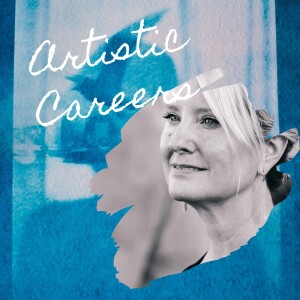
Thursday Aug 08, 2024
20: Jessica Henkin on Live Storytelling & Being Emotionally Present
Thursday Aug 08, 2024
Thursday Aug 08, 2024
Jessica Henkin is the co-founder of Stoop Storytelling, a Baltimore-based live show and podcast featuring "ordinary" people telling extraordinary, true tales of their lives. Stoop held its first live show back in 2006 and has since welcomed nearly 4,000 people to its stages across Baltimore. In our conversation, Jessica shares about what makes a powerful live story, how to connect with your audience, why being emotionally present is so important, and how listening to personal stories has caused her to fall more in love with humanity.
Stoop Storytelling Podcast: https://podcasts.apple.com/us/podcast/the-stoop-storytelling-series/id262444919
This episode is sponsored in part by a grant from the Maryland State Arts Council.
------------------------------------
Also mentioned in this episode:
- "Listening Is An Act of Love" by Dave Isay
- The Moth
- Stoop Storytelling event at Manor Mill on Aug 16, 2024
- Stoop Storytelling on WYPR
------------------------------------
If you enjoyed this episode, you also might enjoy:
- Elana Fishbein on Improv Performance, Becoming a Better Communicator, and the Importance of Psychological Safety (Ep. 6)
- Mike Drucker on Stand-Up Comedy, Sharing First Drafts, and Embracing Kindness in Comedy (Ep. 10)
- Andrew Auseon on "Spellbinders" and What Video Games Teach Us about Storytelling (Ep. 12)
------------------------------------
This show is hosted by Tiffany Aurora: https://tiffanyaurora.com
If you enjoy this podcast, please take a moment to Follow the Show wherever you listen to podcasts. Ratings and reviews on Apple Podcasts and Spotify are also appreciated.
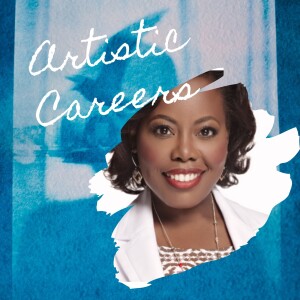
Tuesday Jul 23, 2024
19: Celeste Stacey on Identifying Chronic Overwhelm and Recovering from Burnout
Tuesday Jul 23, 2024
Tuesday Jul 23, 2024
Celeste Stacey is a Mental Wellness Coach and entrepreneur who specializes in helping high-achieving individuals identify and recover from chronic overwhelm. In this episode, we discuss the progression from stress to anxiety to chronic overwhelm and ways to notice when you're headed towards burnout; the different ways coaches and consultants serve businesses and business leaders; how to determine whether you need to work with a therapist, a coach, and/or a psychiatrist in your personal journey toward mental wellness; and how Celeste's own burnout from a previous entrepreneurial venture led to her becoming a Mental Wellness Coach.
Are You Feeling the Hum? video: https://celestestacey.com/hum/
------------------------------------
Also mentioned in this episode:
- Forbes article, "Navigating Entrepreneurship And Mental Health: Lessons I Learned That May Help You, Too"
- Young Vo interview
------------------------------------
If you enjoyed this episode, you also might enjoy:
- Dr. Tracy Hall on Wellbeing in the Workplace and Skills for Preventing Burnout (Ep. 14)
- Rob Grabow on Writing and Directing a Film, What Drives Us As Creatives, and Tips for Noticing When You Need To Slow Down
------------------------------------
This show is hosted by Tiffany Aurora: https://tiffanyaurora.com
If you enjoy this podcast, please take a moment to Follow the Show wherever you listen to podcasts. Ratings and reviews on Apple Podcasts and Spotify are also appreciated.

Artistic Careers
It’s notoriously difficult to pursue art as a career, but plenty of people do. Their stories might surprise you. They might also help you decide whether you will be most happy pursuing your art as a career, a side hustle, or a hobby.
Artistic Careers is a rebrand of the Entrepreneurs & Artists podcast.
